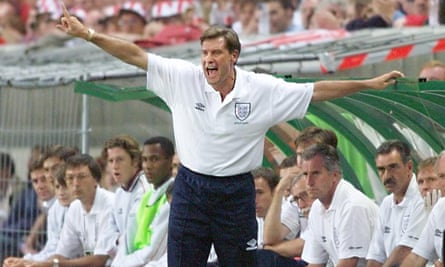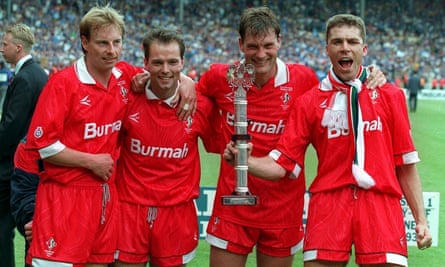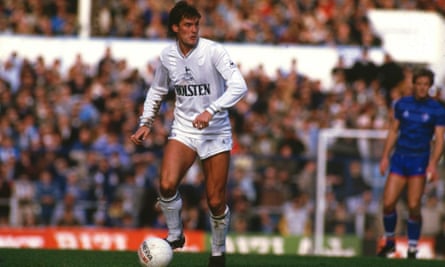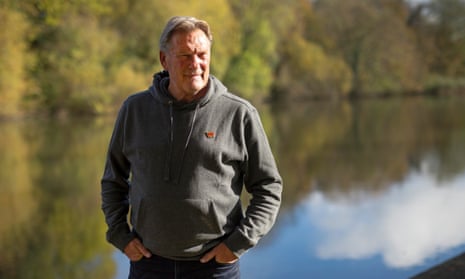“I had courage,” Glenn Hoddle says during a long conversation about life and death, football and identity, heartache and glory, playing and coaching. It is also a conversation about Hoddle himself and where he fits among diverse football figures from Danny Blanchflower, Brian Clough and Johan Cruyff to Arsène Wenger, Daniel Levy and Antonio Conte.
Hoddle was a gifted footballer who played in a way that belonged to Europe rather than England, 30 years before the game in this country caught up with his vision and creativity. He stuck to his playmaking principles and, as a tactically astute coach and manager of England, developed off the field until he was brought down by his own words. Then, in October 2018, Hoddle almost died when he suffered a cardiac arrest, and that experience has made him even more reflective.
“I had a strong belief in my ability,” Hoddle continues as he remembers playing for Spurs, his boyhood club, between 1975 and 1987, when his sumptuous talent collided with the brute force of English football in an era defined by crunching 50-50 tackles and long-ball tactics. He was derided as “Glenda” or a “luxury player” as much as he was revered. But Hoddle remained true to himself. “I had a lot of stubbornness. I was very shy but, when it came to football, I had to do what was natural. If people didn’t understand me, so be it.
“Perhaps if I’d been Dutch or French or Spanish it would have been very different. When I finally went abroad to play [for Wenger’s championship-winning Monaco team from 1987 to 1991] I realised that No 10 was my prime position. I played once at No 10 for England.” That was against Hungary in 1983 when Hoddle scored and created two other goals.

In his enjoyable new autobiography, Playmaker, written deftly by the Observer’s Jacob Steinberg, Hoddle admits he felt “suffocated” playing for England and how “we were painfully small-minded and it took us an eternity to change”. As he says now: “It was always a very rigid 4-4-2 and for England I got chucked out on the right-hand side. Even for Spurs I didn’t play where I should have done until the last season when Clive Allen scored 49 goals and I played as the 10.”
Hoddle was a man out of his time. “I knew that but I couldn’t admit it as a player. People used to say: ‘You should have got more than 53 caps,’ and my answer was always pretty bland and steadfast: ‘I’m proud of the 53 I got.’ But, deep down, I knew I was a continental player. You either give in, and go against your instincts, or you fight it.”
He was strengthened by the belief of others. “I was 19 and Danny Blanchflower [who captained Spurs to the Double in 1960-61] said: ‘Glenn, the luxury player is the one that cannot do what you can do. He cannot see a pass. He keeps giving the ball away. Don’t ever think you’re a luxury player.’ It was a real boost of confidence from the great Danny Blanchflower.”
Brian Clough was another admirer and he even tried to sign Hoddle. “I’ll never forget it,” Hoddle says. “My mate Sean was a good mimic and I picked the phone up and heard this voice: ‘Young man, it’s Brian Clough of Nottingham Forest Football Club.’ I went: ‘Fuck off, Sean,’ and put the phone down. It rung again and it really was Brian Clough. He spent 10 minutes talking to me and I was embarrassed. Clough sussed it and went: ‘It’s pretty obvious you’re staying at Tottenham. It’s been good talking to you and good luck with your career.’ He also said he’d build a team around me if he was England manager. I’m not just saying this because he’d have played me but it was a huge mistake not to appoint him – without a doubt.”

In his book Hoddle laments the fact that, in England, “we were insular and closed off. Our island mentality stood in the way of progress”. He thrived on inclusivity – whether it was genuine delight in playing alongside Ossie Ardíles and Ricky Villa, at a time when there were so few foreign footballers in England, being man-marked by Cruyff or agreeing to join Wenger at Monaco. “I was opening up spiritually,” he says of meeting Wenger. “My intuition and the connection with Arsène told me this is the right move. He wanted me to play No 10 and I loved every minute of being with Arsène and we won the league the first year.”
There was a stark difference between Wenger at Monaco and Arsenal. “Ian Wright, Lee Dixon, Tony Adams and David Seaman all said he’d come in at half-time and would hardly say anything. That wasn’t the Arsène I knew when he was 36. He came into the dressing room sometimes and the old Lucozade bottle would hit the floor. He would shout in French and I’d just look at Mark Hateley and go: ‘He’s not happy, is he?’”
Wenger ignited a fire in him to coach and, in his first managerial position, Hoddle did exceptional work at Swindon. He helped them win promotion to the Premier League and had his happiest time as a coach with a team that, he says, “had something I don’t think I’ve seen even with Barcelona. I’d even go as far as to say maybe with Man City. We had Mickey Hazard, Ross MacLaren, John Moncur and me all being naturally two-footed. It was amazing.”
But the club were so broke that Hoddle loaned Swindon £200,000 to buy Shaun Taylor, a tough defender from Exeter. “I never managed a club that had money. Tottenham didn’t have money, Southampton didn’t and Chelsea didn’t when I arrived [in 1993]. I wanted Andy Townsend to stay because he was Chelsea’s captain. But Villa were after him and Andy wanted to go.
“The facilities at Chelsea were disgraceful. My office was in the staff changing room where there was an old BT phone with the bottom pulled out. They told me to put in a 50p coin and it would drop through to the bottom. You would then put it back into the slot before the call cut out. I’ve got everyone walking in and out and Ron Atkinson [the then Villa manager] said: ‘Glenn, what’s them noises?’ I said: ‘Ron, I’m not even going to tell you.’ We were trying to compete a £2.1m deal and, God, it was horrible.”
Hoddle convinced Ken Bates, the owner, finally to spend some money and he also brought Ruud Gullit and, slowly, began a transformation of Chelsea that would culminate in Roman Abramovich buying the club. In 1996, three years into his managerial career at Stamford Bridge, Hoddle was shocked to be offered the England job. He did well, especially as a young manager, and England played some fine football before losing on penalties to Argentina in the 1998 World Cup. It is a match Hoddle cannot bear rewatching because he believes that, if they had beaten Argentina, they had a team with the potential to have won the tournament.
His England tenure ended in chaos and embarrassment in January 1999 when, during an interview with the Times, he was quoted as saying that disabled people were being punished for sins they had committed in a former life. In his book, he stresses that: “I never spoke about punishment. I never used that word, nor did I talk about karma working from another life or the disabled having to reap what they sowed.”

Matt Dickinson, who carried out the interview, is highly respected and so I ask Hoddle what he thinks when I mention his name. “I’ve managed to use it spiritually, because one of the biggest things is forgiveness. I talked to him about reincarnation, and my belief that it’s an opportunity to learn when we come back. I’ve forgiven him and, in a way, I think spiritually I’ve gained.”
Hoddle denies he said the alleged words and told me: “Before I was 30, I probably would never have been able to forgive, but my faith and spiritual life has allowed me to see this is an opportunity. I haven’t got any feelings of bitterness about what happened.” A day after our interview, on Friday, Dickinson wrote a column in which he stressed the veracity of his reporting and said how he wished Hoddle would “take responsibility” for the interview.
On 27 October 2018, his 61st birthday, Hoddle suffered a near fatal cardiac arrest while working in the BT Sport studios. He was only saved by the quick response of Simon Daniels, a sound technician who gave him CPR and knew how to use a defibrillator. “One of the few things I remember from that day was that I said to Johnno, my driver who dropped me off: ‘See you at half past five.’ You know what I say now when I go back to the same studio? ‘Johnno, see you at half past five … God willing.’ He says: ‘Oh, don’t say that!’ But I do. That’s how close I was to going. I think: ‘Please God, let me come back and get in that car at half past five.’ It was frightening for everyone, not just me.”
Hoddle looks well now and we are soon talking football and Spurs again – for he managed the club he loves from 2001 to 2003. He remains a fan and I ask him if he has ever met the reclusive owner of Spurs? “No. I’ve never met Joe Lewis. Never even had a phone call. Never had a conversation with him and Spurs were always my club. That was the happiest I should have been but it was probably the most disgruntled I felt – at Tottenham. It was such a shame because I wanted it so much. I wanted to build a side to win the league like we did at Monaco. That was one of my big regrets but the money wasn’t there.”
He could have bought both Fernando Morientes from Real Madrid and Samuel Eto’o from Mallorca for just £12m in 2003. But, he says, Lewis and Daniel Levy, the Tottenham chairman, moved too slowly. “That hurt me big time,” Hoddle says.

He gets on passably with Levy but he makes it plain that life is never easy with a chairman who like to haggle over every aspect of Tottenham’s business. Hoddle nods when I ask if he believes Levy has backed himself into a corner after his recent choices of managers have failed and he has had to make concessions to lure the driven but combustible Conte to Spurs.
“I’m not privy to it but, looking from the outside, he has exhausted other opportunities. He’s had to go back for Conte [after they failed to reach agreement in the summer] so there must be a difference in the negotiation. This is a crucial time for Daniel because his track record of sacking managers is there for everyone to see. We could have brought in three good players for the amount of money given to pay out managers.”
The old playmaker looks up and, still full of hope and yearning, he smiles. “I’m praying to God that we get it right because, as a Spurs man, I just want them to be successful.”
Playmaker by Glenn Hoddle is published by HarperCollins
